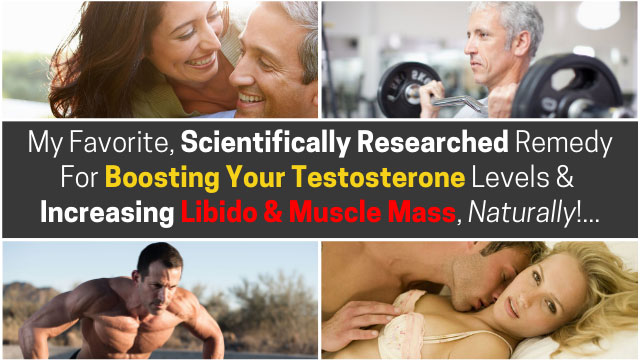It’s 2024 and today’s topic is very important for anyone who wants to have
- more muscle
- less fat
- better libido
- improved memory
- more confidence & happiness
…and you simply want to look and feel young and this has to do with increasing your testosterone levels, and improving your “youth” hormones, naturally…

And yes, all of the benefits I mentioned are related to having optimal testosterone levels.
And yes, this affects BOTH men and women, young and of course, more so older guys after the age of 30.
However, this article is going to be a quick summary for anyone who is in a rush or who read the original article and wants a reminder of “4 clinically proven and best ways to increase your testosterone.”
1 – Diet To Increase Testosterone
Your diet – what you eat AND don’t eat – is extremely important for controlling your hormones.

Your PROTEIN should come from natural sources, such as wild salmon, pastured whole eggs and grass-fed bison/buffalo are my favorites and most powerful “testosterone” boosting proteins.
Your CARBS should come from vegetables, white rice, yams, quinoa and fruits. These are the best absorbed, least insulinogenic and non-inflammatory and lectin-free sources.
Your FATS should come from extra virgin coconut and olive oil, macadamia, hemp and flaxseed oil. Having about 20%-25% of your diet from a mixture of these fats creates optimal hormones, and minimizes inflammation.
2 – Exercise To Increase Testosterone
Exercise is extremely important.
Unfortunately, most people do too much or the wrong forms, which causes an increase in stress hormones and lowers testosterone.

You need to lift weights – do so 3-4x weekly or every other day.
Keep your workouts to less than an hour, including the warm-up.
This is because too much high-intensity exercise increases stress hormones and lowers testosterone.
As far as cardiovascular, the best is daily brisk walks for 20-30 min or you can do them on your “off” days. The worst is strenuous cardio such as running or similar intense activities.
3 – Stress Management To Increase Testosterone
Most people leave out this part of the equation.
When stress hormones go up, testosterone levels go down and so do other youthful hormones.

Make sure you improve your sleep and get what you need. Deep, restful sleep improves all of your hormones.
Go to bed before 11 pm and try to take a nap or simply relax or meditate 30 min during the day.
Also, reduce negativity in your life — thoughts, friends, information that comes to you and so forth.
Stress is both physical and emotional.
4 – Supplements To Increase Testosterone
Most of us are lacking in plant extracts, herbs, vitamins and minerals.
The way foods are made and raised these days, the lack of nutrients in the soil and the extra stressful lifestyle we all live… causes deficiencies.
Add in the fact that the older you get, the worse your absorption becomes and you MUST add in supplements to your diet.
After lots of testing, blood work, and clinical studies, I’ve noticed that the most effective supplements that help boost your testosterone and optimize your “youth hormones” are:
- Testofen® Fenugreek Extract (Trigonella foenum-graecum; 50% fenusides, 50% Saponins)
- Avena Sativa Extract (Oat Straw 100:1)
- Tongkat Ali Extract (Eurycoma Longifolia Jack 100:1)
- Maca Root (6% Extract)
- Bulgarian Pro-Tribulus™ Terrestris Extract (90% Sapongenins + 40% protodioscin)
- Stinging Nettle (95% Extract) (Urtica Dioica)
- L-Arginine
- Zinc + Copper
… and actually a few more.
There you have it – 4 clinically proven ways to increase your testosterone and optimize your youthful hormones naturally.
- http://www.ncbi.nlm.nih.gov/pubmed/26839520
- http://www.ncbi.nlm.nih.gov/pubmed/21709300
- http://www.ncbi.nlm.nih.gov/pubmed/9345114
- http://www.ncbi.nlm.nih.gov/pubmed/14501599
- http://www.ncbi.nlm.nih.gov/pubmed/15889125
- http://www.ncbi.nlm.nih.gov/pubmed/7714119
- http://www.ncbi.nlm.nih.gov/pubmed/3360302
- http://www.ncbi.nlm.nih.gov/pubmed/10355847
- http://www.ncbi.nlm.nih.gov/pubmed/14988451
- http://www.ncbi.nlm.nih.gov/pubmed/1984562
- http://www.ncbi.nlm.nih.gov/pubmed/9029197
- http://www.ncbi.nlm.nih.gov/pubmed/21855365
- http://www.ncbi.nlm.nih.gov/pubmed/3360302
- http://www.ncbi.nlm.nih.gov/pubmed/2526906
- http://www.ncbi.nlm.nih.gov/pubmed/6538617
- http://www.ncbi.nlm.nih.gov/pubmed/22234399
- http://www.ncbi.nlm.nih.gov/pubmed/15204068
- http://www.ncbi.nlm.nih.gov/pubmed/10454175
- http://www.ncbi.nlm.nih.gov/pubmed/16298085
- http://www.ncbi.nlm.nih.gov/pubmed/9629234
- http://www.ncbi.nlm.nih.gov/pubmed/20537171
- http://www.ncbi.nlm.nih.gov/pubmed/21242800
- http://www.ncbi.nlm.nih.gov/pubmed/19321573
- http://www.ncbi.nlm.nih.gov/pmc/articles/PMC2726624/
- http://www.ncbi.nlm.nih.gov/pubmed/21154195
- http://www.ncbi.nlm.nih.gov/pubmed/20050857

